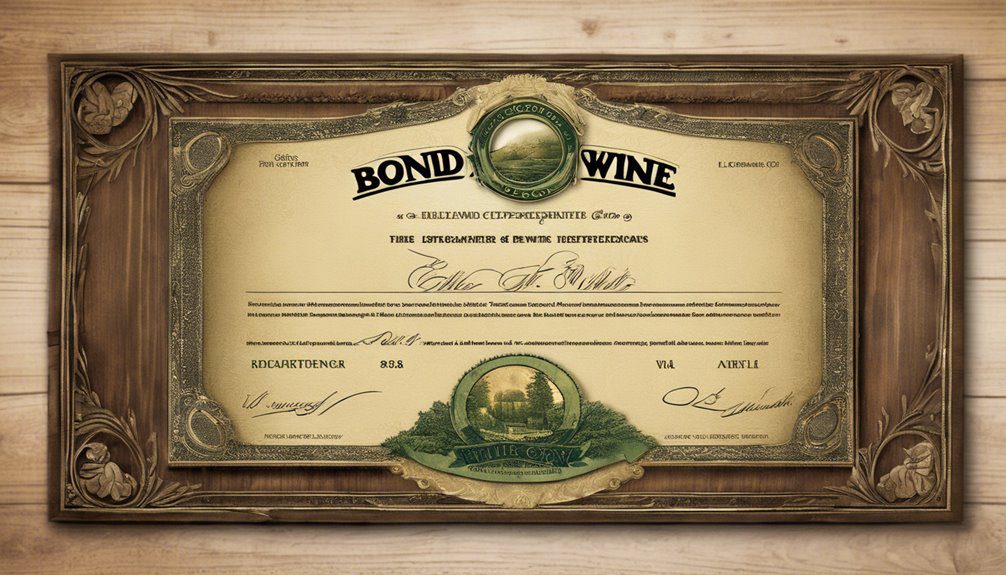If you're considering selling alcohol for off-premises consumption in Oregon, understanding the Licensee Bond requirements is crucial. This bond not only serves as a financial guarantee but also ensures you're in compliance with state laws, which can protect your business from potential legal issues. You'll need to review your eligibility and the application process carefully to avoid pitfalls. But what happens if you fail to meet these obligations, and how can you select the right surety company to help you navigate this landscape? The answers could significantly impact your business's success.
What Is an Off-Premises Bond?

Understanding what an off-premises bond is can be crucial for anyone involved in the sale of alcohol. This type of bond acts as a financial guarantee that you, as a licensee, will comply with state laws and regulations regarding the sale of alcoholic beverages.
If you operate a business, like a grocery store or convenience store, that sells alcohol for consumption away from your premises, this bond is often a requirement for obtaining your liquor license.
An off-premises bond ensures that you'll pay any fines or damages resulting from violations of alcohol laws. If you fail to adhere to these regulations, the bond can be used to cover the costs incurred by the state or other entities.
This protects not only the government but also the community from the consequences of non-compliance.
In essence, an off-premises bond serves as a safety net, helping to maintain responsible alcohol sales in your establishment. Furthermore, understanding the specific state-specific bond requirements is essential for ensuring compliance with local regulations.
It's important to secure this bond before applying for your liquor license, as it demonstrates your commitment to adhering to the legal standards expected in the alcohol industry.
Purpose of the Licensee Bond
The purpose of the licensee bond is to ensure that you comply with state laws governing the sale of alcohol, protecting both your business and the community. This bond acts as a financial safety net, guaranteeing that you'll adhere to regulations regarding licensing, sales practices, and responsible alcohol distribution.
By securing this bond, you demonstrate your commitment to operating within the legal framework established by the Oregon Liquor Control Commission.
If you fail to meet these legal requirements, the bond provides a means for the state and affected parties to seek compensation for any damages or violations. This not only helps maintain the integrity of your business but also fosters trust within the community you serve. It reassures customers and neighbors that you take your responsibilities seriously.
Additionally, the bond can enhance your business's reputation, showing that you prioritize compliance and ethical practices. This can lead to increased customer loyalty and potentially more business opportunities. Insurance broker bonds protect consumers against fraudulent practices by brokers, reinforcing the importance of maintaining high standards in business operations.
Eligibility Requirements

To qualify for a licensee bond in Oregon, you must meet specific eligibility requirements set by the Oregon Liquor Control Commission. First, you need to be a legal entity, such as an individual, partnership, or corporation, and you must have a valid liquor license for off-premises sales.
It's crucial that your business complies with all local, state, and federal laws related to alcohol distribution.
Additionally, your credit history plays a significant role in the approval process. You should have a good credit score, as this reflects your financial responsibility. If you've had previous violations or issues with alcohol licensing, that could impact your eligibility.
Moreover, you'll need to provide a surety bond that meets the required amount, which typically varies based on your projected sales and risk assessment. This bond acts as a financial guarantee that you'll adhere to all regulations. Understanding the importance of surety bonds in Florida can help you navigate similar requirements in other states.
Application Process
Navigating the application process for a licensee bond in Oregon involves several key steps.
First, you'll need to gather all necessary documentation, including your business license, identification, and any relevant financial information. This ensures you meet the eligibility requirements set by the Oregon Liquor Control Commission (OLCC).
Next, you'll complete the bond application form. Make sure to provide accurate information, as any discrepancies could delay the process.
After submitting your application, you may have to pay an application fee, so be prepared for that expense.
Once your application is submitted, it's time to secure your bond. You'll typically work with a surety company or a bonding agent. They'll assess your financial standing and provide a quote for the bond premium.
It's wise to shop around for the best rates, as prices can vary.
After securing your bond, you'll receive a bond certificate, which you must submit to the OLCC along with your completed application.
Bond Amounts and Limits

Understanding bond amounts and limits is crucial for any business applying for a licensee bond in Oregon. The Oregon Liquor Control Commission (OLCC) requires you to secure a bond to ensure compliance with state laws regarding alcohol sales. Typically, the bond amount is set at $10,000 for off-premises licensees, but this can vary based on specific factors related to your business.
It's essential to note that the bond serves as a financial guarantee, protecting consumers and the state from potential losses incurred due to your actions or negligence. If you violate any regulations, claims can be made against your bond, which might lead to financial repercussions for you.
Moreover, the bond amount reflects the level of risk associated with your business operations. If your business has a history of violations or financial instability, you may be required to secure a higher bond amount. The process of obtaining a bond typically involves an underwriting process that assesses your risk and creditworthiness.
Always check with the OLCC for the most current requirements and ensure you meet them to avoid any licensing issues. Understanding these amounts and limits will help you navigate the licensing process more smoothly and protect your business interests.
Compliance Obligations
Compliance obligations are a critical aspect of maintaining your license with the Oregon Liquor Control Commission (OLCC). To stay in good standing, you've got to adhere to all state laws and OLCC regulations regarding the sale and distribution of alcohol. This means you need to keep up with any changes in the law that could affect your operations.
You're responsible for ensuring that all employees understand the rules around serving alcohol, including age verification and responsible service practices. Regular training sessions can help keep everyone informed and compliant. Documenting these training sessions is essential, as you may need to provide proof of compliance if asked by the OLCC.
Additionally, you must maintain accurate records of all alcohol sales and inventory. This information should be readily available for inspection by OLCC agents. Failure to do so can lead to complications in your licensing status.
Lastly, ensure that your premises meet all health and safety standards, as compliance in these areas is also part of your obligations. By staying informed and proactive about these requirements, you can help maintain your license and ensure a successful operation.
Consequences of Non-Compliance

Failing to meet your compliance obligations with the Oregon Liquor Control Commission (OLCC) can lead to serious consequences. If you don't adhere to regulations, you risk losing your license to sell alcohol. The OLCC takes compliance very seriously, and any infractions can trigger investigations.
Depending on the severity of the violation, you might face hefty fines, and these financial penalties can accumulate quickly. In addition to fines, repeated non-compliance might result in a suspension or revocation of your license.
Losing your license not only impacts your revenue but can also tarnish your business reputation. If customers see that you've been penalized, they may choose to take their business elsewhere.
Moreover, your surety bond may be affected. Failure to comply could lead to claims against your bond, further complicating your financial situation. This could make it difficult for you to obtain a bond in the future, impacting your ability to operate legally.
How to Choose a Surety Company
Selecting the right surety company can significantly impact your ability to maintain compliance with the Oregon Liquor Control Commission. Start by researching companies with a strong reputation in the industry. Look for those that specialize in liquor bonds and have experience dealing with the specific requirements of the Oregon Liquor Control Commission.
Next, check their financial stability. You want a surety company that can back your bond without issues. A good way to do this is by reviewing their ratings from independent agencies like A.M. Best or Standard & Poor's. High ratings indicate reliability.
Also, consider their customer service. You'll want a surety company that's responsive and easy to work with. Reach out to them with questions and assess how promptly and thoroughly they respond.
Frequently Asked Questions

When you're navigating the requirements of the Oregon Liquor Control Commission, you might've several questions about the licensee bond process. One common question is, "What's the purpose of this bond?" Essentially, the bond ensures compliance with state laws and protects the state's interests in case of violations.
You may also wonder about the bond amount. The required amount can vary based on your specific licensing category. It's best to check the latest guidelines from the OLCC to confirm your requirements.
Another frequent concern is, "How do I apply for a licensee bond?" You'll need to work with a surety company that's licensed in Oregon. They'll guide you through the application process and assess your creditworthiness.
If you're asking, "What happens if I don't get a bond?" Failing to secure the bond could lead to delays in obtaining your liquor license—and you don't want that!
Lastly, you might be curious about the bond's duration. Typically, these bonds are valid for one year, but be sure to renew it on time to maintain your license. Additionally, surety bonds play a crucial role in providing financial security for various industries, including those related to liquor licensing.
Don't hesitate to reach out to your surety provider for any additional questions you have!
Conclusion
In summary, the Oregon Liquor Control Commission Licensee Bond (Off-Premises) Bond is crucial for businesses selling alcohol for off-premises consumption. It ensures compliance with state laws and protects your business from potential violations. By understanding the requirements and processes, you can navigate this essential obligation with ease. Remember to choose a reliable surety company and stay on top of your renewal to maintain your liquor license and uphold your business's reputation.

